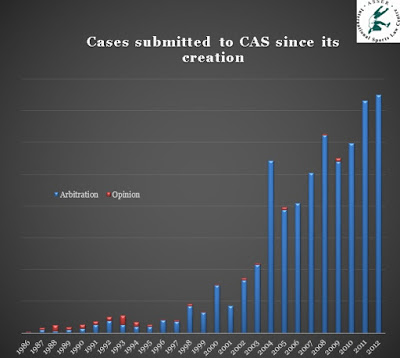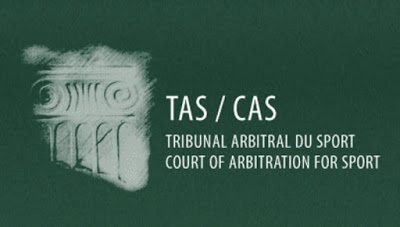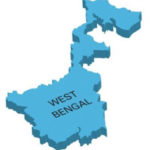Offside: A Look Into The International Court Of Arbitration For Sports
In the era of
globalization which has witnessed countless disputes involving interests of
multiple Countries and as such disputes become prominent, a profusion of
international tribunals have been brought into existence in order to meet the
demands of dispute settlement in a manner which is in accordance with the
common principles of natural justice so as to deliver justice to the aggrieved
party. However in reality such tribunals are at best seen as a work in
progress.
globalization which has witnessed countless disputes involving interests of
multiple Countries and as such disputes become prominent, a profusion of
international tribunals have been brought into existence in order to meet the
demands of dispute settlement in a manner which is in accordance with the
common principles of natural justice so as to deliver justice to the aggrieved
party. However in reality such tribunals are at best seen as a work in
progress.
All hope is not lost,
there exists, at least in my opinion, a single international court which rises
beyond the obstacles that plague its more herald brethren such as the
International Court of Justice (‘ICJ’) and International Criminal Court (‘ICC’)
in form of the Court of Arbitration for Sports or in short ‘CAS’.
there exists, at least in my opinion, a single international court which rises
beyond the obstacles that plague its more herald brethren such as the
International Court of Justice (‘ICJ’) and International Criminal Court (‘ICC’)
in form of the Court of Arbitration for Sports or in short ‘CAS’.
The visionaries behind
CAS sought the concerned body to become the ‘Supreme Court’ for all sports
related disputes. In reality the CAS has attained the status for which it was
conceived[1]. On 30th June 1983 upon
ratification of the statute of the CAS by the International Olympic Committee
(‘IOC’) did the presence of the CAS become official. The CAS is headquartered
in Lausanne, Switzerland[2]
and has decentralized offices in New York, United States of America as well as
in Sydney, Australia[3].
CAS sought the concerned body to become the ‘Supreme Court’ for all sports
related disputes. In reality the CAS has attained the status for which it was
conceived[1]. On 30th June 1983 upon
ratification of the statute of the CAS by the International Olympic Committee
(‘IOC’) did the presence of the CAS become official. The CAS is headquartered
in Lausanne, Switzerland[2]
and has decentralized offices in New York, United States of America as well as
in Sydney, Australia[3].
The CAS enjoys
jurisdiction over most sports governing bodies such as WADA, FIFA[4],
IOC, NBA, UEFA, IWF, IAAF and other regulatory sports authorities. Hence
cementing its status as a broadly accepted and recognized Court for dispute
resolution.
jurisdiction over most sports governing bodies such as WADA, FIFA[4],
IOC, NBA, UEFA, IWF, IAAF and other regulatory sports authorities. Hence
cementing its status as a broadly accepted and recognized Court for dispute
resolution.
A major hindrance to
the recognition of the achievements of the CAS as a widely recognised dispute
resolution body is that the body purely caters to disputes which pertain to
medals or games, rather than disputes involving basic human rights or
territorial matters. The scope of sports related disputes have been held in low
esteem by several criticizers of the success of the CAS. Critics have seem to
forgotten that sports arouses the deepest emotions in the ardent fans
irrespective of the kind of game being played. A few noticeable examples of
such are the numerous clashes between fans during the local derby between Mohun
Bagan and East Bengal in India, the Heysel Stadium Disaster in which close to
50 spectators lost their lives as well as upwards of 600 spectators were
injured due to a stampede caused by unruly fans in Brussels, Belgium in 1985[5]
and lastly the actions of angry fans beheading a referee in an act of revenge
for giving an incorrect decision during a match in Brazil[6].
In short, cynics are simply mistaken when they denigrate the importance of
sports. Sports can inspire our passions, capture our hopes and give us a reason
to dream[7].
the recognition of the achievements of the CAS as a widely recognised dispute
resolution body is that the body purely caters to disputes which pertain to
medals or games, rather than disputes involving basic human rights or
territorial matters. The scope of sports related disputes have been held in low
esteem by several criticizers of the success of the CAS. Critics have seem to
forgotten that sports arouses the deepest emotions in the ardent fans
irrespective of the kind of game being played. A few noticeable examples of
such are the numerous clashes between fans during the local derby between Mohun
Bagan and East Bengal in India, the Heysel Stadium Disaster in which close to
50 spectators lost their lives as well as upwards of 600 spectators were
injured due to a stampede caused by unruly fans in Brussels, Belgium in 1985[5]
and lastly the actions of angry fans beheading a referee in an act of revenge
for giving an incorrect decision during a match in Brazil[6].
In short, cynics are simply mistaken when they denigrate the importance of
sports. Sports can inspire our passions, capture our hopes and give us a reason
to dream[7].
Jurisdiction of CAS:
Principally CAS
adjudicates over disputes involving either a commercial element or pertaining
to disciplinary issues.
adjudicates over disputes involving either a commercial element or pertaining
to disciplinary issues.
By commercial element reference is made to disputes
essentially revolving around the execution of contracts, such as those relating
to sponsorship, the sale of television rights, the staging of sports events,
player transfers and relations between players or coaches and clubs and/or
agents (employment contracts and agency contracts). Disputes relating to civil
liability issues also come under this category (e.g. an accident to an athlete
during a sports competition).
essentially revolving around the execution of contracts, such as those relating
to sponsorship, the sale of television rights, the staging of sports events,
player transfers and relations between players or coaches and clubs and/or
agents (employment contracts and agency contracts). Disputes relating to civil
liability issues also come under this category (e.g. an accident to an athlete
during a sports competition).
Disciplinary cases on the other hand represent the disputes
submitted to the CAS, of which a large number are doping-related. In addition
to doping cases, the CAS is called upon to rule on various disciplinary cases
(violence on the field of play, abuse of referees, etc).
submitted to the CAS, of which a large number are doping-related. In addition
to doping cases, the CAS is called upon to rule on various disciplinary cases
(violence on the field of play, abuse of referees, etc).
 |
Info Via: Asser International Sports Law blog |
Along with the prior mentioned disputes the CAS also deals
with disputes arising out of contentious results of any tournament[8].
with disputes arising out of contentious results of any tournament[8].
Generally speaking as
is the case with any arbitration clause, a specific clause is to be made for
reference of any sports related dispute to be referred to the CAS. Thus an
arbitration clause stating recourse to the CAS in case of a dispute is a must
between parties[9].
In addition to the above the parties may enter into a written agreement post
the existence of a dispute stating recourse to CAS for adjudication over the
subject matter of the dispute[10].
Lastly as per the code of arbitration for sports related disputes, the Court is
empowered to only exercise its jurisdiction over matter connected to sports in
some manner or the other[11].
On that note it is pertinent to note that the CAS till date has not dismissed
any dispute so referred to it on the grounds that the concerned dispute is
insufficiently allied to sports[12].
is the case with any arbitration clause, a specific clause is to be made for
reference of any sports related dispute to be referred to the CAS. Thus an
arbitration clause stating recourse to the CAS in case of a dispute is a must
between parties[9].
In addition to the above the parties may enter into a written agreement post
the existence of a dispute stating recourse to CAS for adjudication over the
subject matter of the dispute[10].
Lastly as per the code of arbitration for sports related disputes, the Court is
empowered to only exercise its jurisdiction over matter connected to sports in
some manner or the other[11].
On that note it is pertinent to note that the CAS till date has not dismissed
any dispute so referred to it on the grounds that the concerned dispute is
insufficiently allied to sports[12].
Structure of CAS[13]:
CAS comprises of two
divisions, firstly the Ordinary Arbitration Division (‘OAD’) and secondly the
Appeals Arbitration Division (‘AAD’). The request for arbitration is forwarded
to the concerned division depending upon the nature of dispute between the
parties.
divisions, firstly the Ordinary Arbitration Division (‘OAD’) and secondly the
Appeals Arbitration Division (‘AAD’). The request for arbitration is forwarded
to the concerned division depending upon the nature of dispute between the
parties.
– The OAD sets in motion panels which are
entrusted with the task of resolving disputes subject to ordinary arbitration
procedure[14]. The AAD on the other hand resolves
disputes subject to the appeals arbitration procedure[15].
entrusted with the task of resolving disputes subject to ordinary arbitration
procedure[14]. The AAD on the other hand resolves
disputes subject to the appeals arbitration procedure[15].
–
The Ad hoc Division: The CAS ensures its
presence during major sporting events[16]
in order to hear and to provide swift decisions within a span of 24 hours from
the time of filing the appeal by any participating Country or athlete.
The Ad hoc Division: The CAS ensures its
presence during major sporting events[16]
in order to hear and to provide swift decisions within a span of 24 hours from
the time of filing the appeal by any participating Country or athlete.
–
Parties
are also offered to the option to opt for mediation[17]
prior to engaging in ordinary arbitration process[18].
Parties
are also offered to the option to opt for mediation[17]
prior to engaging in ordinary arbitration process[18].
Applicable Law:
As is the case with any
ordinary arbitration process the concerned parties have the luxury to come to a
consensus as to the relevant applicable law to the dispute. Failure on part of
the parties to come to terms as to applicable law results in the Swiss law by
default being the applicable law.
ordinary arbitration process the concerned parties have the luxury to come to a
consensus as to the relevant applicable law to the dispute. Failure on part of
the parties to come to terms as to applicable law results in the Swiss law by
default being the applicable law.
With respect to appeal
arbitration process the procedure slightly differs in case the parties fail to
come to terms as to consensus over applicable law. As per the CAS code[19]
the arbitration panel would pass its award as per the rules and regulations
governing the body concerned by the
appeal. In simple terms the applicable law in which the concerned body is
domiciled.
arbitration process the procedure slightly differs in case the parties fail to
come to terms as to consensus over applicable law. As per the CAS code[19]
the arbitration panel would pass its award as per the rules and regulations
governing the body concerned by the
appeal. In simple terms the applicable law in which the concerned body is
domiciled.
Award and Appeal:
Any award passed by a
panel with respect to OAD and AAD is binding and final upon the parties. However there
exists limited scope for appeal in form of recourse to Swiss Federal Tribunal on grounds
of lack of jurisdiction, lack in carrying out basic procedural rules or
incompatibility with public policy. However such an appeal proviso is applicable
to associations, bodies or persons having domicile, place of business or
habitual residence in Switzerland and when the parties have not expressly
excluded further setting aside proceedings in the arbitration agreement[20].
panel with respect to OAD and AAD is binding and final upon the parties. However there
exists limited scope for appeal in form of recourse to Swiss Federal Tribunal on grounds
of lack of jurisdiction, lack in carrying out basic procedural rules or
incompatibility with public policy. However such an appeal proviso is applicable
to associations, bodies or persons having domicile, place of business or
habitual residence in Switzerland and when the parties have not expressly
excluded further setting aside proceedings in the arbitration agreement[20].
About the Author:
Abhijeet ‘Loki’ Andrews, is currently a final year student at Faculty of Law, IFHE, Hyderabad. Abhijeet loves writing about Sports and Environmental Law, whenever he is not busy playing football or skipping across the country adjudicating at Parliamentary Debates.
[1] Ian Blackshaw, Sport’s Court getting right results,
Guardian (London), 3rd June 2004 at 31
Guardian (London), 3rd June 2004 at 31
[3] Richard H.
Mclaren, Introducing the Court of
Arbitration for Sport: The Ad Hoc Division at the Olympic Games, 12 MARQ.
SPORTS L. REV. 515,520(2001).
Mclaren, Introducing the Court of
Arbitration for Sport: The Ad Hoc Division at the Olympic Games, 12 MARQ.
SPORTS L. REV. 515,520(2001).
[4] In its govening
statutes, FIFA has officially recognized CAS, “to resolve disputes between
FIFA, Members, Confiderations, Leagues, Clubs, Players, Officials, Licensed
Match Agents and Players’ agents.” VIII FIFA Stat. Article 59, Para. 1 (2005).
statutes, FIFA has officially recognized CAS, “to resolve disputes between
FIFA, Members, Confiderations, Leagues, Clubs, Players, Officials, Licensed
Match Agents and Players’ agents.” VIII FIFA Stat. Article 59, Para. 1 (2005).
[7] Daniel H. Yi,
“Turning Medals into Metal: Evaluating the Court of Arbitration for Sport as an
International Tribunal” (2006). Student
Scholarship Papers, Page 24.
“Turning Medals into Metal: Evaluating the Court of Arbitration for Sport as an
International Tribunal” (2006). Student
Scholarship Papers, Page 24.
[8] See South Korean View on America: From
Admiration to Antipathy, KOREA TIMES, 10th May 2003.
Admiration to Antipathy, KOREA TIMES, 10th May 2003.
[9] Code of Sports related Arbitration, Supra note
22, Article R27.
22, Article R27.
[10] ibid
[11] ibid
[12] See Matthieu Reebm, The Court of Arbitration for Sport, in DIGEST OF CAS AWARDS III
2001-2003 xxxiii (Matthieu Reeb ed. Kluwer 2004)
2001-2003 xxxiii (Matthieu Reeb ed. Kluwer 2004)
[13] See pg. 6, CAS Guide to Arbitration
[14] Mainly those
disputes referred to the CAS by way of an arbitration clause.
disputes referred to the CAS by way of an arbitration clause.
[15] Mostly disputes
arising out of a decision of any sports regulatory authority. Prime example
would be the Transfer ban imposed upon FC Barcelona of Spain by FIFA, which in
turn was appealed at the CAS.
arising out of a decision of any sports regulatory authority. Prime example
would be the Transfer ban imposed upon FC Barcelona of Spain by FIFA, which in
turn was appealed at the CAS.
[16] Few examples are
Olympic Games, FIFA World Cup, Commonwealth Games, Asian Games etc.
Olympic Games, FIFA World Cup, Commonwealth Games, Asian Games etc.
[17] However such an
option is rarely utilized by the parties who prefer to enage in OAP.
Statistically since 1999 the CAS has handled only 30 mediation applications.
option is rarely utilized by the parties who prefer to enage in OAP.
Statistically since 1999 the CAS has handled only 30 mediation applications.
[19] See, CAS Code of sports related arbitration, Procedural Rules, C R58.
[20]
See, CAS Code of sports related arbitration, Procedural Rules, B R46 and C R59.
See, CAS Code of sports related arbitration, Procedural Rules, B R46 and C R59.




![Police Reforms – Priority ignored [Republished from Epilogue Press] Police Reforms – Priority ignored [Republished from Epilogue Press]](https://arguendo.co.in/wp-content/uploads/2017/07/41-150x150.jpg)

Leave a Reply